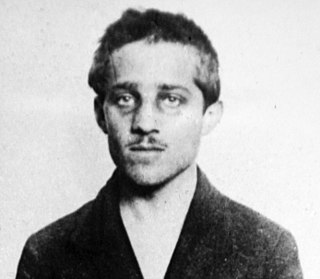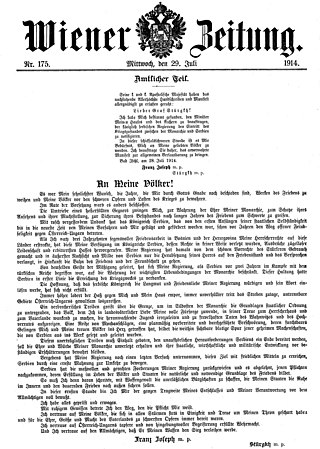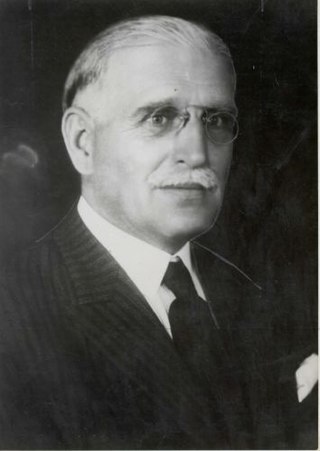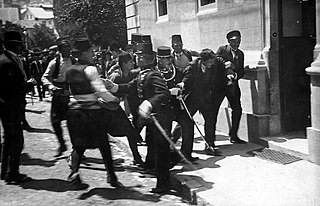
Gavrilo Princip was a Bosnian Serb student who assassinated Archduke Franz Ferdinand, heir presumptive to the throne of Austria-Hungary, and his wife Sophie, Duchess von Hohenberg, in Sarajevo on 28 June 1914. The killing of the Archduke and his wife set off the July Crisis, a chain of events that within one month led to the outbreak of World War I.

The Agadir Crisis, Agadir Incident, or Second Moroccan Crisis was a brief crisis sparked by the deployment of a substantial force of French troops in the interior of Morocco in July 1911 and the deployment of the German gunboat SMS Panther to Agadir, a Moroccan Atlantic port. Germany did not object to France's expansion but wanted territorial compensation for itself. Berlin threatened warfare, sent a gunboat, and stirred up German nationalists. Negotiations between Berlin and Paris resolved the crisis on 4 November 1911: France took over Morocco as a protectorate in exchange for territorial concessions to German Cameroon from the French Congo.

The Triple Entente describes the informal understanding between the Russian Empire, the French Third Republic, and the United Kingdom of Great Britain and Ireland. It was built upon the Franco-Russian Alliance of 1894, the Entente Cordiale of 1904 between France and Britain, and the Anglo-Russian Entente of 1907. It formed a powerful counterweight to the Triple Alliance of the German Empire, the Austro-Hungarian Empire, and the Kingdom of Italy. The Triple Entente, unlike the Triple Alliance or the Franco-Russian Alliance itself, was not an alliance of mutual defence.
Sleepwalker(s) or The Sleepwalker(s) may refer to:

The identification of the causes of World War I remains a debated issue. World War I began in the Balkans on July 28, 1914, and hostilities ended on November 11, 1918, leaving 17 million dead and 25 million wounded. Moreover, the Russian Civil War can in many ways be considered a continuation of World War I, as can various other conflicts in the direct aftermath of 1918.

Sergei Dmitryevich Sazonov GCB was a Russian statesman and diplomat who served as Foreign Minister from November 1910 to July 1916. The degree of his involvement in the events leading up to the outbreak of World War I is a matter of keen debate, with some historians putting the blame for an early and provocative mobilization squarely on Sazonov's shoulders, and others maintaining that his chief preoccupation was "to reduce the temperature of international relations, especially in the Balkans".
The Pig War, or Customs War, was a trade war between Austria-Hungary and the Kingdom of Serbia in 1906 to 1908 during which the Habsburgs unsuccessfully imposed a customs blockade on Serbian pork.

Sir Christopher Munro Clark is an Australian historian living in the United Kingdom and Germany. He is the twenty-second Regius Professor of History at the University of Cambridge. In the 2015 Birthday Honours, he was knighted for his services to Anglo-German relations.

Jörn Leonhard is a historian and professor of Western European History at the History Department of the University of Freiburg since 2006. From 2007 to 2012, he was co-director of the School of History at the Freiburg Institute for Advanced Studies (FRIAS). His published works focus on the history of liberalism, nationalism, empires and wars. Leonhard has received several important research awards. His books “Die Büchse der Pandora” (2014) as well as “Der Überforderte Frieden” (2018) established him as an important representative in the research of global history.

Alfred von Kiderlen-Waechter was a German diplomat and politician who served as Secretary of State and head of the Foreign Office from June 1910 to December 1912. He is best known for his reckless role in the Agadir Crisis in 1911, when France militarily expanded its control of Morocco. He demanded compensation in an aggressive saber-rattling fashion, sent a warship to the scene and whipped up nationalist sentiment inside Germany. A compromise was reached with France, which took control of Morocco and gave Germany a slice of the French Congo. However, the British were angry at German aggressiveness and talked of war. The episode, although small itself, permanently soured prewar relations between Berlin and London.
Historians writing about the origins of World War I have differed over the relative emphasis they place upon the factors involved. Changes in historical arguments over time are in part related to the delayed availability of classified historical archives. The deepest distinction among historians remains between those who focus on the actions of Germany and Austria-Hungary as key and those who focus on a wider group of actors. Meanwhile some historians, such as Fritz Fischer, maintain that Germany deliberately sought war while others do not. The main distinction among the latter is between those who believe that a war between the "Great Powers" was ultimately unplanned but still caused principally by Germany and Austria-Hungary taking risks, and those who believe that either all or some of the other powers, namely Russia, France, Serbia and Great Britain, played a more significant role in risking war than had been traditionally suggested.

Volker Ullrich is a German historian and journalist.
Alexander James Watson is a British historian. He is the author of three books, which focus on East-Central Europe, Germany and Britain during World War I. His most recent book, The Fortress: The Great Siege of Przemysl was praised by The Times newspaper as a "masterpiece". His previous book, Ring of Steel: Germany and Austria-Hungary at War, 1914-1918, won numerous awards. Currently Watson is Professor of History at Goldsmiths, University of London.

France entered World War I when Germany declared war on 3 August 1914.

On 28 July 1914, Austria-Hungary declared war on Serbia. Within days, long-standing mobilization plans went into effect to initiate invasions or guard against them and Russia, France and Britain stood arrayed against Austria and Germany in what at the time was called the "Great War", and was later named "World War I" or the "First World War". Austria thought in terms of one small limited war involving just the two countries. It did not plan a wider war such as exploded in a matter of days.

The United Kingdom entered World War I on 4 August 1914, when King George V declared war after the expiry of an ultimatum to the German Empire. The official explanation focused on protecting Belgium as a neutral country; the main reason, however, was to prevent a French defeat that would have left Germany in control of Western Europe. The Liberal Party was in power with prime minister H. H. Asquith and foreign minister Edward Grey leading the way. The Liberal cabinet made the decision, although the party had been strongly anti-war until the last minute. The Conservative Party was pro-war. The Liberals knew that if they split on the war issue, they would lose control of the government to the Conservatives.

Slavko J. Grujić was a Serbian diplomat, marshal of the court, and philanthropist. A skilled diplomat he was one of the main contributors of the response to the Austrian ultimatum of 23 July 1914, which some scholars have called "a masterpiece of diplomatic equivocation". After the First World War, he became Yugoslavia's first ambassador to the United States returning to serve as Marshal of the Court to King Peter II of Yugoslavia. He died in London, while serving as ambassador of Yugoslavia to the United Kingdom, in 1937.

The war guilt question is the public debate that took place in Germany for the most part during the Weimar Republic, to establish Germany's share of responsibility in the causes of the First World War. Structured in several phases, and largely determined by the impact of the Treaty of Versailles and the attitude of the victorious Allies, this debate also took place in other countries involved in the conflict, such as in the French Third Republic and the United Kingdom.

Maja Göpel is a German political economist, transformation researcher, and sustainability scientist with a focus on transdisciplinary. In 2019 she co-founded the Scientists for Future initiative. Göpel is an honorary professor at Leuphana University of Lüneburg.

Arrest of a Suspect in Sarajevo, also erroneously known as The Arrest of Gavrilo Princip, is a historically significant photograph that captured the immediate aftermath of the assassination of Archduke Franz Ferdinand of Austria and his wife Sophie, Duchess of Hohenberg, in Sarajevo on 28 June 1914. Originally believed to depict the apprehension of the assassin, Gavrilo Princip, the image gained widespread attention after being featured prominently on the front cover of the Austrian weekly newspaper Wiener Bilder on 5 July 1914. This portrayal played a crucial role in generating patriotic sentiments that unified allied nations at the onset of World War I.















